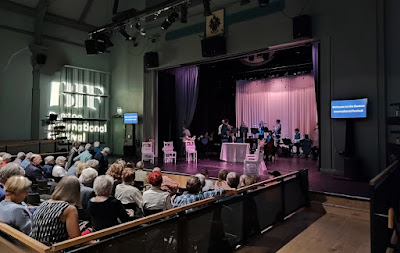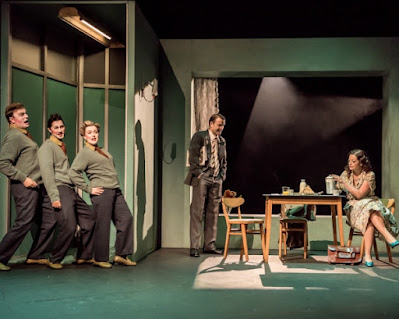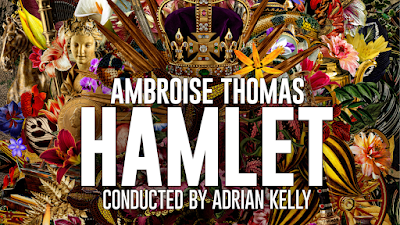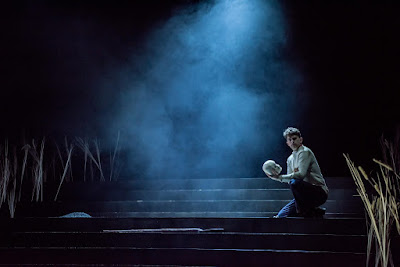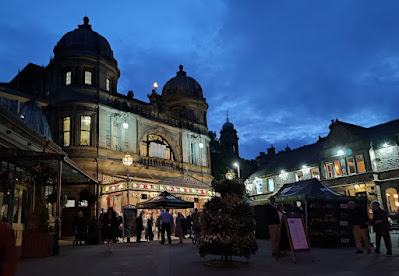Marc-Antoine Charpentier - La descente d’Orphée aux enfers
Vache Baroque, 2025
Jonathan Darbourne, Jeanne Pansard-Besson, Gwilym Bowen, James Geidt, Betty Makharinsky, Naho Koizumi, Katie-Louise Dobson, Frances Gregory, Francis Gush, Lars Fischer, Michael Roche, Fi Silverthorn, Kenji Matsunaga
Pavilion Arts Centre, Buxton - 24th July 2025
Buxton often invite a specialist early opera company as an addition to the main programme at the Buxton International Festival, and this music always seems to be a good fit for the Pavilion Arts Centre in the town. Not equipped with an orchestra pit, it isn't always the best way to see reduced productions of full scale operas (Ethel Smyth's The Boatswain's Mate suffered from this last year) and the stage does need to be rearranged to accommodate a chamber orchestra as well as a stage performance for a baroque opera, but with some creativity - like the Liberata Collective's production of Handel's Orlando done with Baroque Gesture in the theatre in 2023 - it seems to work spectacularly well. This year Vache Baroque brought a thrilling and very rare work to this year's festival, Charpentier’s chamber opera La descente d’Orphée aux enfers, and it was one of the highlights of the festival.
The opera was composed between 1686-87 while Charpentier was commissioned to write works for Marie de Lorraine, Duchess of Guise, a wealthy cousin of Louis XIV who became his patron. Charpentier, with a small company of musicians and singers, of which he was one himself, composed a number of pastoral and allegorical works for the Duchess at her urban palace in the Marais district of Paris. La descente d’Orphée aux enfers (The Descent of Orpheus into the Underworld) however remained unfinished at the time of the death of the Duchess in 1688. Intended to run to three acts, only the first two acts were set to music, the music for the third act lost or never completed, although it still exists in libretto form.
Charpentier has been going through a revival lately with a great deal of work being done on that front by William Christie. Having rescued and almost exhausted works by Rameau and Lully that have remained unheard for centuries, he and his Les Arts Florissantes company have turned their attention to this composer and will actually be performing a version of this same work in Valencia later this year (still without a third act sadly - although if ever there was a case for putting AI to good use, an attempt at recreation of the final act would be worth hearing). I'm sure that production will be marvellous, Christie always successfully dusting off ancient works like this and making them feel fresh and invigorating, but even if it is only half as good as this production by Vache Baroque at the Buxton International Festival, it will be marvellous.
The work itself is simply a marvel. Of course, the Orpheus myth has been the drama behind some of the greatest and indeed earliest opera works ever composed, but the story of a singer/musician, half-human/half-divine who charms demons and the god of the Underworld with his song, is an inspirational one for any composer. Charpentier follows the story we are familiar with, perhaps not jumping straight into the mournful grieving of Orpheus for the already expired Eurydice before plunging straight into hell as in C.W. Gluck's pared back Orphée et Eurydice, but allowing the work to have more life and colour, from the wedding celebration of the couple in Act I to the proposed depiction of the death of Orpheus torn apart by the furious Maenads in Act III.
Even without the missing third Act, Charpentier's La descente d’Orphée aux enfers is revealed here truly as a thing of great beauty. The strength of the composition is in how the Charpentier expresses the depth and dynamic range of human sentiments that the myth offers and elevates it with otherworldly music that is persuasive enough to provide an instructive moral on the nature of being human and yet through all those challenges aspire to follow our better nature. It has the purity of sentiment matched with artistry that Gluck was aspiring to bring back to opera in the reformist agenda of his own version of this story, in the process revealing himself to be a kind of Orpheus in this regard, reclaiming the power and the purity of the lyric drama.
With two extant magnificent acts to work with, Vache Baroque in this production directed by Jeanne Pansard-Besson, find beautiful contrasts in the settings and the music for each act. The wedding of Orpheus and Euridice in Act I is all beautiful pastel colours in the wedding costumes, highlighting the colour of the occasion and the music before it all turns to horror when Euridice is bitten by a snake and dies. The lively performance was of course stylised but felt natural and celebratory, not just of the wedding but of the music composed for it. The second Act was just as engaging and stylised for the journey into Hades, the condemned souls Orpheus encounters there wearing black and white costumes like Gothic clowns somehow feeling strangely appropriate. The movement choreography also played an important role - all credit to Simeon Qsyea - with two dancers included in the team, mirroring the flow of the haunting music in Act II but also the journey from ceremony to chaos in the first Act.
The singing voices also fully matched the intent of the composition and its meaning, playing their part in the remarkable dynamic of the drama. The fervency of Gwilym Bowen's Orpheus was matched by the unyielding authority of James Geidt's Pluton. The sheer strength of will that is needed to overcome such an impossible endeavour could be felt in such contrasts. In between there was some wonderful ensemble singing and performing, but I also noted wonderful lyricism in Frances Gregory’s Persephone, the bell-like clarity of Naho Koizumi's Daphné and the beautifully blended bass of Martin Roache’s dual role of Apollo and the Promethean Tityé. All were only enhanced by the complementary harmonies of the other voices.
The musical performance under the guidance of musical director Jonathan Darbourne was exquisite. It's always a pleasure to hear period instruments playing such beautiful music, but it's just as thrilling to hear it blend so well with the beautiful writing for voices. Sitting in the front row of the Pavilion Arts Centre takes you as close as you'll ever come to being on an opera stage, to being actually in the opera - another charm of this venue - and from there the separation of voices, the beauty of each and the harmonising of voice types just hits you and brings the whole depth of emotion of the tragedy of the story of Euridice and the boundless ambition of Orpheus to the forefront. It really is a tragedy that the third Act of the opera is lost, but this absorbing work and performance nonetheless felt wonderfully complete.
External links: Buxton International Festival





